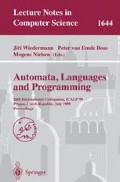Abstract
We propose in this paper a decomposition theorem for the timed automata introduced by Alur and Dill [2]. To this purpose, we define a new simple and natural concatenation operation, indexed by the set of clocks to be reset, on timed automata generalizing the classical untimed concatenation.
Then we extend the famous Kleene’s and Büchi’s theorems on classical untimed automata by simply changing the basic objects to take time into account, keeping the union operation and replacing the concatenation, finite and infinite iterations by the new timed concatenations and their induced iterations.
Thus, and up to our knowledge, our result provides the simplest known algebraic characterization of recognizable timed languages.
Access this chapter
Tax calculation will be finalised at checkout
Purchases are for personal use only
Preview
Unable to display preview. Download preview PDF.
References
R. Alur, C. Courcoubetis, D.L. Dill, N. Halbwachs, and H. Wong-Toi. Minimization of timed transition systems. In Proceedings of CONCUR’92, LNCS 630, 1992.
R. Alur and D.L. Dill. A theory of timed automata. Theoretical Computer Science, 126:183–235, 1994.
R. Alur, L. Fix, and T.A. Henzinger. Event-clock automata: a determinizable class of timed automata. Theoretical Computer Science, 211:253–273, 1999.
R. Alur and T.A. Henzinger. Back to the future: towards a theory of timed regular languages. In Proceedings of FOCS’92, 1992.
E. Asarin. Equations on timed languages. In Proceedings of Hybrid’98, LNCS, 1998.
E. Asarin, P. Caspi and O. Maler. A Kleene theorem for timed automata. In Proceedings of LICS’97, 1997.
B. Bérard. Untiming timed languages. Information Processing Letters, 55:129–135, 1995.
P. Bouyer. Automates temporisés et modularité. Rapport de stage de DEA, LSV, ENS de Cachan, 1998.
P. Bouyer, and A. Petit. Decomposition and composition of timed automata. Technical report LSV-99-1, LSV, ENS de Cachan, 1999.
C. Courcoubetis and M. Yannakakis. Minimum and maximum delay problems in real-time systems. Formal Methods in System Design, pages 385–415, 1992.
B. Bérard, V. Diekert, P. Gastin, and A. Petit. Characterization of the expressive power of silent transitions in timed automata. Fundamenta Informaticae, 36: 145–182, 1998.
J.A. Brzozowski. A survey of regular expressions and their applications. In IRE transactions on Electronic Computers, EC-11(3): 324–335, 1962.
J.R. Büchi. A decision method in restricted arithmetic. In Proc Int Congr. on Logic, Methodology and Philosophy of Science, Stanford University, 1960.
T.A. Henzinger, P.W. Kopke, and H. Wong-Toi. The expressive power of clocks. In Proceedings of ICALP’95, LNCS 944, pages 335–346, 1995.
T.A. Henzinger, X. Nicollin, J. Sifakis, and S. Yovine. Symbolic model checking for real-time systems. Information and Computation, 111(2):193–244, 1994.
S.C. Kleene. Representations of events in nerve and finite automata. Automata Studies, Princeton University Press, 3–42, 1956.
T. Wilke. Specifying timed state sequences in powerful decidable logics and timed automata. In Proceedings of Formal Techniques in Real-Time and Fault-Tolerant Systems, LNCS 863, 1994.
H. Wong-Toi and G. Hoffmann. The control of dense real-time discrete event systems. In Proceedings of the 30th IEEE Conf. on Decision and Control, pages 1527–1528, 1991.
Author information
Authors and Affiliations
Editor information
Editors and Affiliations
Rights and permissions
Copyright information
© 1999 Springer-Verlag Berlin Heidelberg
About this paper
Cite this paper
Bouyer, P., Petit, A. (1999). Decomposition and Composition of Timed Automata. In: Wiedermann, J., van Emde Boas, P., Nielsen, M. (eds) Automata, Languages and Programming. Lecture Notes in Computer Science, vol 1644. Springer, Berlin, Heidelberg. https://doi.org/10.1007/3-540-48523-6_18
Download citation
DOI: https://doi.org/10.1007/3-540-48523-6_18
Published:
Publisher Name: Springer, Berlin, Heidelberg
Print ISBN: 978-3-540-66224-2
Online ISBN: 978-3-540-48523-0
eBook Packages: Springer Book Archive

